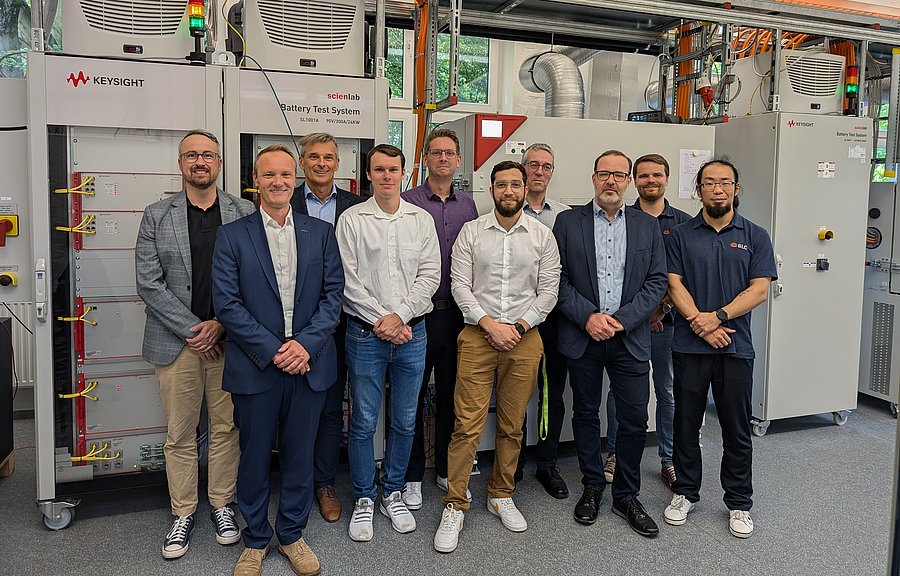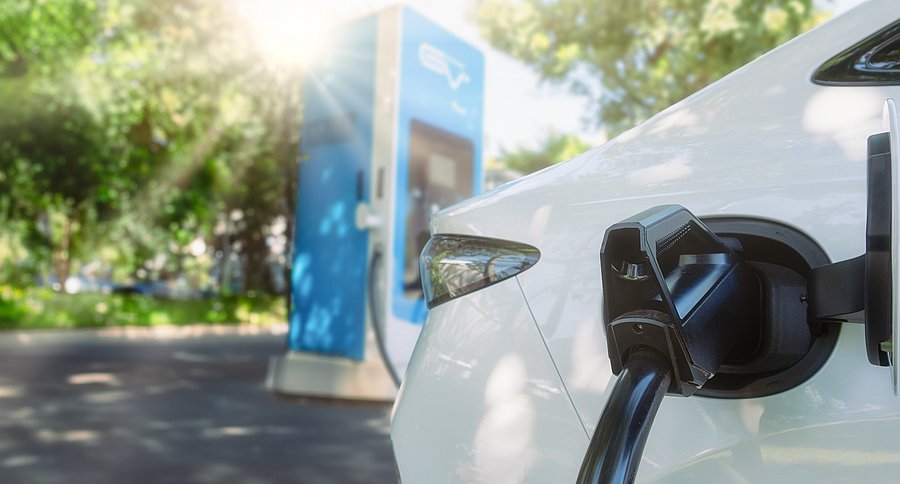Creating more storage capacity
"Re-use" research project drives innovative re-use of electric vehicle batteries

The project consortium met at the University of Wuppertal at the beginning of July to kick off "Re-use" // Photo Bergische Universität
By developing reliable testing and classification procedures, the project consortium comprising Second Life Batteries GmbH (project lead), BLC - The Battery Lifecycle Company GmbH, the University of Wuppertal and Keysight Technologies Deutschland GmbH aims to enable used electric vehicle batteries to be used as stationary energy storage devices with guaranteed performance and utilisation efficiency. This innovation is intended to promote the market launch of "second life" batteries for private and commercial applications.
Technical instruments and methods are already being developed for testing used electric vehicle batteries. In future, an innovative testing device should be able to efficiently determine and assess the various states of the batteries. These developments enable selective utilisation of batteries and are incorporated into the "battery passport" or Digital Product Passport (DPP), which contains information on the sustainability and life cycle of the batteries. This will make it possible to reliably determine in future for which further use the battery is best suited.
The project partners categorise
Prof. Dr Benedikt Schmülling, Institute of Electric Mobility and Energy Storage Systems at the University of Wuppertal, says: "The 'Re-use' project is an outstanding example of how research and industry can work together to drive forward sustainable solutions. At the University of Wuppertal, we are working on developing robust and reliable testing methods that optimise the reuse of electric vehicle batteries. This is an important step towards increasing resource efficiency and minimising environmental impact."
Stefan Naust, Managing Director of Second Life Batteries GmbH and project coordinator: "The 'Re-use' project aims to create a marketable product from reused lithium-ion batteries. The aim is to develop a guarantee promise for the capacity and service life of the batteries in order to promote their broad acceptance and use. The batteries are to be redefined and offered according to their state of health."
"The use of end-of-life vehicle batteries as stationary power storage units will enable a significant increase in the availability of storage capacities in stationary applications," adds Mathias Nippraschk, Project Manager at BLC. "Manufacturers of stationary storage systems are currently competing with the automotive industry, which represents a very high demand for the electrification of mobility among all battery producers. The use of certified 'second life' batteries can alleviate this bottleneck in the medium term."

Optimising the reuse of electric vehicle batteries is one of the central goals of the "Re-use" research project. // Photo Colourbox
More background: Enough "juice" for other tasks
Among other things, certain chemical wear mechanisms that cannot be prevented mean that the batteries are no longer powerful enough for use in electric cars. It is currently common practice for electric vehicle batteries to be replaced and disposed of or temporarily stored after a service life of up to eight years. Their raw materials are valuable, but their recycling is still very labour- and energy-intensive, which significantly increases the carbon footprint of the batteries. In addition, the process is not yet economically viable, as the value of the recovered materials does not cover the costs of the multi-stage process.
All the more remarkable: when the vehicle manufacturer's warranty expires, the removed batteries still have an energy content of 50 to 80 per cent of their original capacity. This makes them attractive for many other applications. For example, as power storage units for private households, emergency generators or - in the form of several interconnected batteries - as large storage units for industry to store and utilise solar and wind power for production. This reuse of batteries as stationary energy storage systems can significantly delay recycling processes. This not only reduces CO₂ emissions, but also helps to ease the current shortage of recycling capacities.
The "Re-Use - Re-purpose of electric vehicle batteries" project is being funded by the state of North Rhine-Westphalia and the European Union as part of the GreenEconomy.IN.NRW innovation competition with funds from the European Regional Development Fund and via the Just Transition Fund (ERDF/JTF programme NRW 2021-2027). The University of Wuppertal has around 718,000 euros at its disposal.

